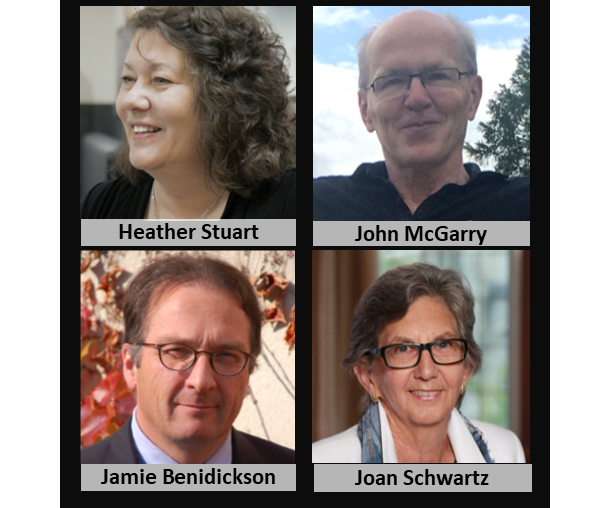
RSC presents:
Eastern Ontario Regional Seminar
A Luncheon Lecture with RSC speakers: Heather Stuart, John McGarry, Jamie Benidickson and Joan SchwartzThe Royal Society of Canada invites you to an RSC Fellows’ four-part lecture series that will take place at Queen’s University on Saturday, April 13th, 2019. Starting at 9:30am, the event is held at the Queen’s University Club’s Conference Room (168 Stuart St.).Each speaker will give a presentation on their area of research with talks being open and free to the general public. It is possible to just attend a portion of the day. Following the morning session, Queen’s Principal Daniel Woolf is hosting a luncheon in the upstairs dinning room.
Following the morning session, Principal Daniel Woolf is hosting a luncheon in the upstairs dining room.
Registration is required for the luncheon and costs $30 which includes a three-course meal with wine.
Registration for the luncheon by April 5th, 2019 would be appreciated.
Please RSVP for the luncheon through Eventbrite at the registration link found below, by phone, 613-533-6000 x78797, or, email: FEAS.ResearchAdmin@queensu.ca
Time and Location
April 13, 9:30am-4:30pm,
Open to public-free with an option for Principal's Luncheon (30$)
Queen's University Club, 168 Stuart St., Kingston, Ontario
Registration
Program
Biographies
| 9:30am | Coffee and Pastries
| 10:00am | Heather Stuart, FRSC, Bell Canada Mental Health and Anti-stigma Research Chair, Queen's
The Nature and Nurture of Mental Illness Related Stigma
| 11:00am | John McGarry, FRSC, Sir Edward Peacock Professor and Canada Research Chair in the Department of Political Studies, Queen's
'The Diplomat's Graveyard': Why resolving the Cyprus problem is not easy
| 12:00pm | Principal's Luncheon
Three-course meal with complimentary wine [30$/person]
Register for the luncheon here
| 2:00pm | Jamie Benidickson, FRSC, Faculty of Law, University of Ottawa
Sewage Then and Now: Public Health Challenges and Climate Change Opportunities
| 3:00pm | Joan Schwartz, FRSC, Department of Art History and Art Conservation, Queen's
Rethinking Discursive OriginsL Alexander von Humboldt, Photography and the Pursuit of Geographical Knowledge
Heather Stuart: The Nature and Nurture of Mental Illness Related Stigma
This presentation will begin by placing stigma in the Canadian context, by referring to statistics that show how Canadians think and act toward people with a mental illness. It will visit the role played by knowledge and attitudes in driving discriminatory behaviours. The presentation will examine how stigma has been defined and redefined over time and will place stigma in the context of a human rights and human justice framework. Next, the presentation will consider how stigma is nurtured in our culture and consider its many consequences. Finally, it will present avenues for stigma reduction and consider barriers that may get in the way of effective programming.
John McGarry: ‘The Diplomat’s graveyard’: Why resolving the Cyprus problem is not easy
Cyprus has been described as a “diplomat’s graveyard” and the Cyprus problem as “diplomacy’s Rubik’s cube”. After over 50 years of failed negotiations, it ranks alongside the Israeli-Palestinian conflict and the Kashmir conflict as one of the world’s most intractable disputes. In my talk, I seek to explain the nature of the Cyprus problem and why it has been so difficult to resolve.
Jamie Benidickson: Sewage Then and Now: Public Health Challenges and Climate Change Opportunities
For nineteenth and twentieth-century cities, sewage and wastewater presented significant public health challenges in the context of changing scientific understanding of disease transmission, engineering innovation and legal transformation. Alongside drinking water purification and distribution systems, the regulation of wastewater treatment and the development of new civic infrastructure made important contributions to the well-being of communities around the world. In the twenty-first century, municipal wastewater and sewage streams offer interesting opportunities as aspects of the global response to climate change. Again, some integration of legal, technological and scientific expertise will be called for whether the goal is water supply recharge, or biogas production, or heat recovery systems at municipal scale.
Joan Schwartz: Rethinking Discursive Origins: Alexander von Humboldt, Photography, and the Pursuit of Geographical Knowledge
Yucatan was a mecca for nineteenth-century travellers and explorers inspired by the writings of Alexander von Humboldt and by rumours of fantastical ruins of an ancient civilization. Naturalists, drawn to its exotic flora and fauna were additionally rewarded with archaeological finds, reports of which further piqued European curiosity. The advent of photography in 1839 made it possible to produce purportedly objective and truthful visual records to substantiate travellers’ accounts and claims of archaeological discovery. Beyond its scientific application as a tool of field-work in Yucatan, the camera was also carried by itinerant photographers and early tourists as a lucrative means of subsidizing their travels. This presentation examines the place of Alexander von Humboldt at the dawn of photography and highlights his influence on a succession of camera-carrying Austrian, American, British, Hungarian, and French travellers through Yucatan in the first decade and a half after the first announcements of the new medium.


